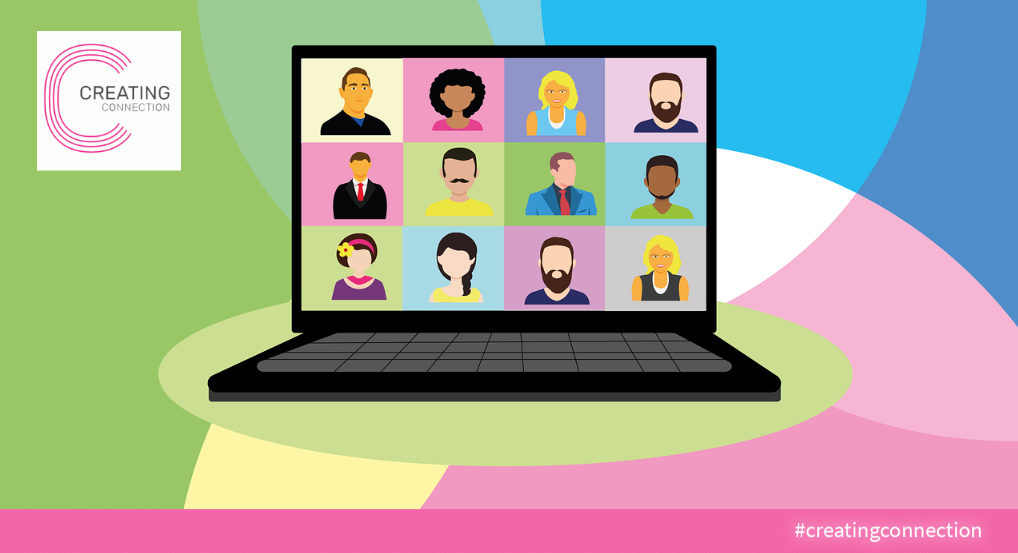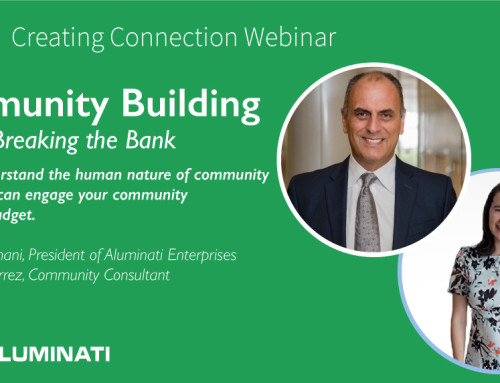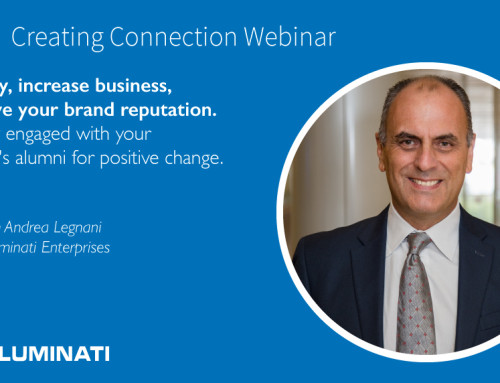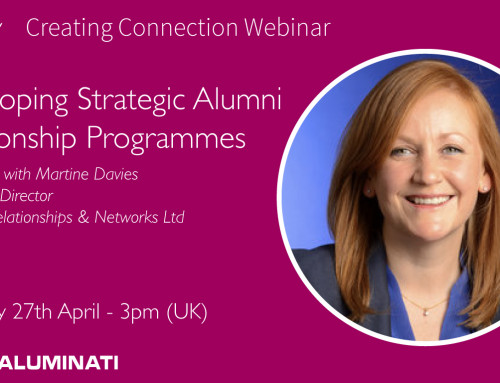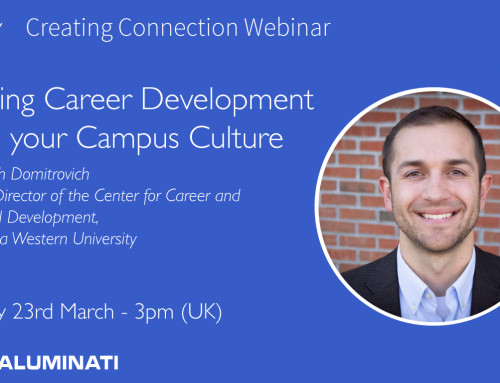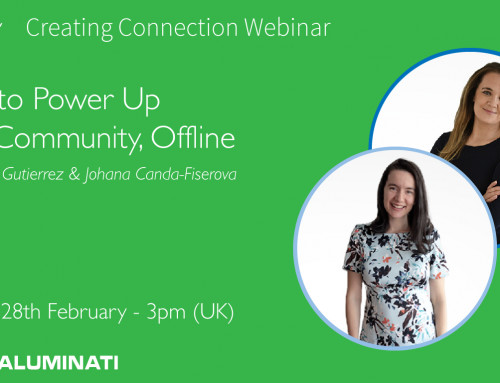This Virtual Roundtable was held on the 27/May/2020. This session focused on the management of alumni communities around the world. Delegates from 16 institutions and schools joined to learn and share how to develop international engagement programmes and tackle similar challenges.
Below we present the highlights and takeaways from this Creating Connection event.
Creating Connection events are for members of the Community Builders network. If your work involves building community, managing networks or strengthening affinity, it is free for you to join.
Sign up for your Community Builder’s membership.
Introducing the topic and first spotlight speaker, Dr Maria, KITE Education
SPOTLIGHT 1: An Emerging International Trend: The creation of nation-wide alumni networks
Maria Gallo, Research Fellow and founder of KITE
Maria’s Global Alumni Whitepaper
https://www.keepintoucheducation.com/resources
Maria’s guest blog for Aluminati:
https://www.aluminati.net/global-alumni-volunteers/
A new alumni relations trend – the participation of governments! – What does this look like?
- Generally, it takes two basic forms:
- Networks managed by a national agency open to ALL international alumni (and sometimes domestic alumni living abroad) to stay connected with their country of study (e.g. Holland Alumni Network, Germany’s AlumniPortal.
- Specialised groups of international alumni, usually nationally-sponsored funded scholarships or awards(e.g. Chevening Awards, Orange Knowledge Programme in the Netherlands).
- There are also two main focuses of the networks (might seem familiar!)
- For alumni benefit – career development, mentorship, social/networking events
- For national priority benefit- enhance international recruitment, next batch of international students, retaining international talent, research, innovation or public diplomacy
- See my KITE White Paper (page 23) to see the typology on an x/y axis, for an opportunity to ‘plot’ your own alumni initiatives
- What can alumni relations programmes learn (and leverage) through knowledge of these global alumni networks?
- There is a growing interest by governments in their diaspora, diaspora work is growing worldwide
- AND alumni are becoming more recognised by governments as a key component of their diaspora.
- Governments are interested in alumni engagement to:
- Building Internationalisation of Education
- Supporting and retaining people with talent
- Sharing Knowledge, Research and Innovation
- Fostering Public Diplomacy and the United Nations Sustainable Development Goals (SDGs)
- Learning:
- There are diverse ways to engage alumni, especially in a public diplomacy, intercultural competences and identify the ways alumni are an inspiration in meeting the sustainable development goals.-Government alumni are OUR alumni!
- This isn’t a competition. Our alumni may feel an affinity with their government-funded award programme FIRST then their university of study, this can ebb and flow between awards connections and the university alumni engagement offerings.
- How can universities leverage LOCAL international alumni groupings related to national awards? Perhaps a Chevening Awards winners special chapter within your university? For alumni, this is about shared experience and the closer the experience the more it can be powerful. I won’t take credit for this idea- I am mentoring an Irish Aid Fellowship Award winner who attended an Irish university and she suggested to me that she would be interested in meeting other fellow awards winners who also went to her university- this might be a small group, but it could be a very active one.
- How can you work with your government/your national awards agency in a collaborative way? This might include offering your university as a venue in different times or partnering on an online Webinar for a Commonwealth Alumni or Holland Alumni Network event. Learning: promoting government-led/supported alumni networks to our alumni might be other avenues of support to our alumni during this most challenging time, especially in term of careers, indeed alumni may wish to give their time to support others through these national networks.
- Finally, even when I started in alumni relations in the 1990s they were having All-Canadian alumni events- perhaps they were ahead of their time. These events are ways to be more resource savvy, offer an economy of scale, while offering excellent programming or ideas for your alumni. These alumni collaborations could be across so many ways.
Is your university part of a wider collaborative network of universities? Examples are:
- the World Universities Network https://wun.ac.uk/wun/members
- the International Association of Universities https://www.iau-aiu.net/
- the Members Association of Commonwealth Universities https://www.acu.ac.uk/our-members/International
- Sustainable Campus Network https://international-sustainable-campus-network.org
- And many more!
There are many more. Ask your Institutional Research Office if they are aware of the networks that your university is proudly affiliated with both nationally and internationally. Two of my own alma maters are University College Dublin and University of Sheffield are WUN members. These may seem random, but if you are thinking of doing an event in a new country, perhaps you could outreach to another one of these networks OR if you wish to arrange an online events based on the findings of the knowledge work of these networks out to alumni, this could be a strategic way to collaborate. They could also be a shared way to find universities to get support or insight into their alumni work.
- Rest assured that more national-based alumni networks are in the pipeline, more have emerged across Europe. Apparently there is interest in both a Scotland Global Alumni Network and indeed one in Wales (alongside Ireland).
- I believe in the famous JFK quote: A rising tide lifts all boats We can learn from and leverage the connections with these government-led global alumni networks, consider collaboration and promote them to our alumni, for the benefit of the higher education sector in our country, for our own institutions and for our alumni.
SPOTLIGHT 2: An Emerging International Trend: The creation of nation-wide alumni networks
Nena Grceva, Head of Alumni Relations at Central European University (CEU)
The Central European University (Grad school, Has dual accreditation: American and Hungarian based in Budapest, and now a site in Vienna. Has 1600 students annually that come from 120 countries), 6 staff members to focus on alumni engagement working closely with fundraising and careers.
Zoom in to microlevel from the macro approach that Maria spoke about.
Everything we do by default is international and global.
We have a robust volunteer engagement programme all over the world.
How the new normal has changed our approach?
For example, we hosted our Alumni Reunion, even a Gala night online (previously a ticketed, fancy event, now free and online) – 200 alumni attended this online Gala! Added an interactive element of preparing a picture or word about their university experience to share with attendees.
TU Delft – example that combines both approaches (government & universities) – Formed the Dutch Engineers Alumni Network together with 3 other universities to reach international alumni.
Nena, CEU describes the challenges of online events.
Challenges:
Increased no-show (50%)
Thematic events in fall
All free events (no revenue)
But despite challenges, there is huge potential for online engagement opening up new spaces for CEU.
Maria’s advice: Ask your alumni what their questions are and what they want and need at this time.
Questions:
Durham University – how to do networking on online events?
Use Breakout rooms function in Zoom
Some platforms like Hoppin also have specific networking features for events
Question Swansea: Do you host international events for prospective students, current students and alumni?
TU Delft does – through an academic visiting country, host events at the embassy or consul’s house, which also saves costs.
Open Roundtable Discussion
Bath – some events with offer holders, alumni, invite parents, shared budget with recruitment team. Taiwan, pick 10 alum to go to offer holder conversion events. Brief on key messages.
China Q&A – supply 1 or 1 alum to each event for recruitment team and are looking at taking those online. These happen in Hong Kong as well.
University of Lincoln – they have an International Ambassadors programme – they train them in their 3rd year as students, and once they graduate they will be in-country supporting activity. They provide key messages to share with markets.
Some success stories of government-led alumni initiatives?
Still a new field of engagement
The Chevening collaborations
Aluminati’s Crisis Responses
Aluminati themselves have created two initiatives to tailor the platform to specific needs of clients at this time:
Admissions Retentions Platform: https://www.aluminati.net/offer-holder-solution/
Session Feedback
This was a friendly, relaxed virtual roundtable of engagement professionals. All attendees confirmed they had found it useful and were keen to have dates set for future events. Aluminati will shortly be sending invites to the next two roundtable events. If you want to be kept in the loop please join our Community Builders network below.
Aluminati’s COVID-19 Support Packages
Aluminati have created two initiatives to support the short term emergency response requirements of the education sector:
Student Admissions Retentions Platform: https://www.aluminati.net/offer-holder-solution/
Join the Community Builders Network
- Become part of a professional and supportive network of peers
- Receive invites to exclusive Creating Connection events including round tables, webinars, regional dinners and drinks
- Receive copies of The Alumination – a newsletter full of community sector insights
- Be invited to the Community Builders Conference

